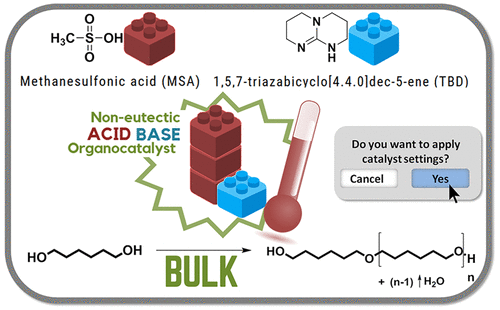当前位置:
X-MOL 学术
›
ACS Sustain. Chem. Eng.
›
论文详情
Our official English website, www.x-mol.net, welcomes your
feedback! (Note: you will need to create a separate account there.)
Polyether Synthesis by Bulk Self-Condensation of Diols Catalyzed by Non-Eutectic Acid–Base Organocatalysts
ACS Sustainable Chemistry & Engineering ( IF 7.1 ) Pub Date : 2019-01-25 00:00:00 , DOI: 10.1021/acssuschemeng.8b05609
Andere Basterretxea 1 , Elena Gabirondo 1 , Coralie Jehanno 1 , Haijin Zhu 2 , Irma Flores 1 , Alejandro J. Müller 1, 3 , Agustin Etxeberria 1 , David Mecerreyes 1, 3 , Olivier Coulembier 4 , Haritz Sardon 1
ACS Sustainable Chemistry & Engineering ( IF 7.1 ) Pub Date : 2019-01-25 00:00:00 , DOI: 10.1021/acssuschemeng.8b05609
Andere Basterretxea 1 , Elena Gabirondo 1 , Coralie Jehanno 1 , Haijin Zhu 2 , Irma Flores 1 , Alejandro J. Müller 1, 3 , Agustin Etxeberria 1 , David Mecerreyes 1, 3 , Olivier Coulembier 4 , Haritz Sardon 1
Affiliation

|
Polyethers constitute a well-established class of polymers covering a wide range of applications from industrial manufacturing to nanomedicine. Nevertheless, their industrial implementation is limited to short chain aliphatic polyethers such as polyethylene glycol (PEO or PEG), polypropylene glycol (PPG), or polytetramethylene glycol (PTMG) produced by the ring-opening polymerization of the corresponding cyclic ethers. Herein, we report a sustainable and scalable approach for the preparation of medium and long chain aliphatic polyethers by the melt self-polycondensation of aliphatic diols in the presence of non-eutectic acid–base mixtures as organocatalyst. These organocatalysts were prepared by forming stoichiometric and non-stoichiometric complexes of methanesulfonic acid (MSA) and 1,5,7-triazabicyclo[4.4.0]dec-5-ene (TBD) as confirmed by NMR spectroscopy and DFT calculations. The non-stoichiometric 2:1 and 3:1 MSA:TBD molar complexes showed superior thermal stability. These non-eutectic acid–base mixtures were tested in the bulk-self-condensation of 1,6-hexanediol leading to telechelic α,ω-hydroxy-poly(oxyhexane). The optimized polymerization conditions involved the use of MSA:TBD (3:1) catalyst in a three-step polycondensation process at 130–180 and 200 °C, respectively. These conditions were applied to the synthesis of a wide range of aliphatic polyethers with a number of methylene units ranging from 6 to 12 units and molecular weights between 5000 and 22 000 g mol–1. The aliphatic polyethers were highly semicrystalline with melting temperatures ranging from 55 to 85 °C. The synthesis approach was extended to the preparation of value-added copolymers from different length chain diols and different functionality, giving rise to different copolymer architectures from linear copolyethers to polyether thermosets. Altogether, this straightforward polymerization strategy enables access to medium–long chain and cross-linked aliphatic polyethers using easily prepared and recyclable organocatalysts.
中文翻译:

非共聚物酸基有机催化剂催化的二元醇本体自缩聚反应合成聚醚
聚醚构成一类公认的聚合物,涵盖从工业制造到纳米医学的广泛应用。然而,它们的工业实施仅限于短链脂族聚醚,例如通过相应的环醚的开环聚合反应制得的聚乙二醇(PEO或PEG),聚丙二醇(PPG)或聚丁二醇(PTMG)。本文中,我们报告了在非共晶酸碱混合物作为有机催化剂存在下,通过脂肪族二醇的熔融自缩聚反应,制备中链和长链脂肪族聚醚的可持续且可扩展的方法。这些有机催化剂是通过形成甲磺酸(MSA)和1,5,7-三氮杂双环[4.4]的化学计量和非化学计量的配合物而制备的。0] dec-5-ene(TBD),由NMR光谱法和DFT计算证实。非化学计量的2:1和3:1 MSA:TBD摩尔配合物显示出优异的热稳定性。这些非低共价酸-碱混合物在1,6-己二醇的本体自缩合反应中生成远螯α,ω-羟基-聚(氧己烷)。优化的聚合条件包括分别在130–180和200°C的三步缩聚过程中使用MSA:TBD(3:1)催化剂。这些条件适用于合成范围广泛的脂肪族聚醚,其亚甲基单元的数量范围为6至12,分子量为5000至22000 g mol。这些非低共价酸-碱混合物在1,6-己二醇的本体自缩合反应中生成远螯α,ω-羟基-聚(氧己烷)。优化的聚合条件包括分别在130–180和200°C的三步缩聚过程中使用MSA:TBD(3:1)催化剂。这些条件适用于合成范围广泛的脂肪族聚醚,其亚甲基单元的数量范围为6至12,分子量为5000至22000 g mol。这些非低共价酸-碱混合物在1,6-己二醇的本体自缩合反应中生成远螯α,ω-羟基-聚(氧己烷)。优化的聚合条件包括分别在130–180和200°C的三步缩聚过程中使用MSA:TBD(3:1)催化剂。这些条件适用于合成范围广泛的脂肪族聚醚,其亚甲基单元的数量范围为6至12,分子量为5000至22000 g mol。–1。脂族聚醚是高度半结晶的,熔融温度范围为55至85°C。合成方法扩展到由不同的长链二醇和不同的官能度制备增值共聚物,从而产生了从线性共聚醚到聚醚热固性化合物的不同共聚物结构。总而言之,这种简单的聚合策略可以使用易于制备且可回收的有机催化剂来获得中长链和交联的脂肪族聚醚。
更新日期:2019-01-25
中文翻译:

非共聚物酸基有机催化剂催化的二元醇本体自缩聚反应合成聚醚
聚醚构成一类公认的聚合物,涵盖从工业制造到纳米医学的广泛应用。然而,它们的工业实施仅限于短链脂族聚醚,例如通过相应的环醚的开环聚合反应制得的聚乙二醇(PEO或PEG),聚丙二醇(PPG)或聚丁二醇(PTMG)。本文中,我们报告了在非共晶酸碱混合物作为有机催化剂存在下,通过脂肪族二醇的熔融自缩聚反应,制备中链和长链脂肪族聚醚的可持续且可扩展的方法。这些有机催化剂是通过形成甲磺酸(MSA)和1,5,7-三氮杂双环[4.4]的化学计量和非化学计量的配合物而制备的。0] dec-5-ene(TBD),由NMR光谱法和DFT计算证实。非化学计量的2:1和3:1 MSA:TBD摩尔配合物显示出优异的热稳定性。这些非低共价酸-碱混合物在1,6-己二醇的本体自缩合反应中生成远螯α,ω-羟基-聚(氧己烷)。优化的聚合条件包括分别在130–180和200°C的三步缩聚过程中使用MSA:TBD(3:1)催化剂。这些条件适用于合成范围广泛的脂肪族聚醚,其亚甲基单元的数量范围为6至12,分子量为5000至22000 g mol。这些非低共价酸-碱混合物在1,6-己二醇的本体自缩合反应中生成远螯α,ω-羟基-聚(氧己烷)。优化的聚合条件包括分别在130–180和200°C的三步缩聚过程中使用MSA:TBD(3:1)催化剂。这些条件适用于合成范围广泛的脂肪族聚醚,其亚甲基单元的数量范围为6至12,分子量为5000至22000 g mol。这些非低共价酸-碱混合物在1,6-己二醇的本体自缩合反应中生成远螯α,ω-羟基-聚(氧己烷)。优化的聚合条件包括分别在130–180和200°C的三步缩聚过程中使用MSA:TBD(3:1)催化剂。这些条件适用于合成范围广泛的脂肪族聚醚,其亚甲基单元的数量范围为6至12,分子量为5000至22000 g mol。–1。脂族聚醚是高度半结晶的,熔融温度范围为55至85°C。合成方法扩展到由不同的长链二醇和不同的官能度制备增值共聚物,从而产生了从线性共聚醚到聚醚热固性化合物的不同共聚物结构。总而言之,这种简单的聚合策略可以使用易于制备且可回收的有机催化剂来获得中长链和交联的脂肪族聚醚。

































 京公网安备 11010802027423号
京公网安备 11010802027423号